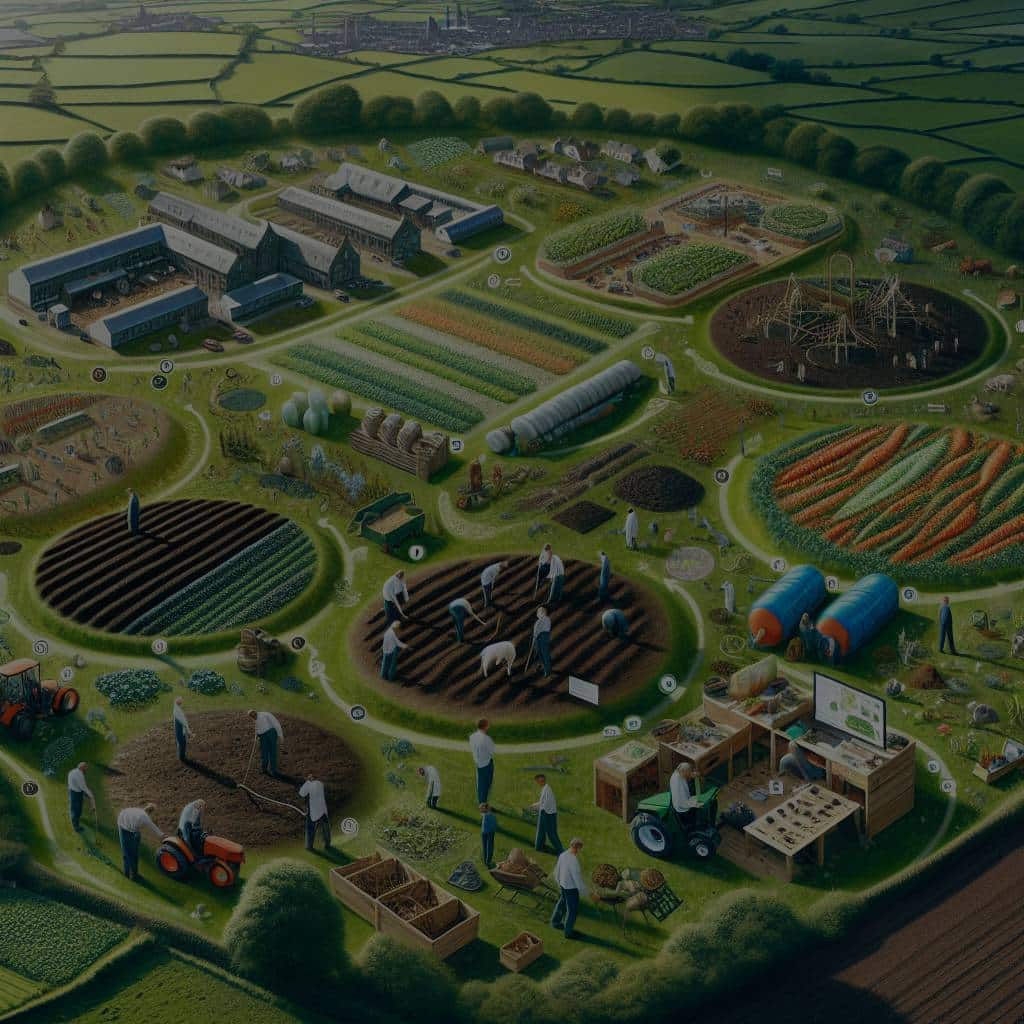The health and vitality of soil are central to the success of any agricultural venture. This is especially true for organic farmers, who eschew synthetic fertilisers and pesticides in favour of natural, sustainable techniques to enrich their soil, bolster crop health, and promote a balanced ecosystem. Recent advances in soil science have heralded a host of innovative strategies for enhancing soil health on organic farms.
One such approach that has gained traction amongst UK farmers is regenerative agriculture – a holistic, principles-based system of farming that seeks to regenerate topsoil, boosting its fertility and carbon-capturing potential. Other techniques centre around the management of water and organic matter in soils, with a view to promoting nutrient-rich, well-structured soils that are resistant to erosion and disease.
Also to discover : How to Implement a Carbon Footprint Tracking System in a Small Manufacturing Business?
In this article, we will delve into these techniques and explore how they contribute to healthier soils and more robust crops on organic farms across the United Kingdom.
Regenerative Agriculture: Revitalising Soils for Robust Crops
Regenerative agriculture is an approach that focuses on regenerating and revitalising soils, thereby improving the viability and productivity of farms. It champions practices like cover cropping, reduced tillage, and rotational grazing, all of which aim to increase soil organic matter and enhance soil health.
In parallel : How Can UK Coffee Shops Utilize Mobile Ordering to Improve Customer Experience?
Cover cropping, a key practice in regenerative agriculture, involves growing crops that are specifically intended to improve soil health. These crops, typically grasses or legumes, are grown not for harvest but to be reincorporated into the soil, enriching it with organic matter and nutrients. This strategy not only boosts soil fertility but also helps to lock away carbon, contributing to efforts to combat climate change.
Similarly, reduced tillage practices minimise disruption to the soil, maintaining its structure and encouraging the growth of beneficial microbes. This results in soil that is more resilient, better able to retain water and nutrients, and less prone to erosion.
Rotational grazing, on the other hand, involves moving livestock around the farm to different grazing areas. This prevents overgrazing, aids in pest management, and allows farmers to make better use of their land. Moreover, it results in more evenly distributed manure, which serves as a natural fertiliser and further boosts soil health.
Water Management: Quenching the Thirst of Healthy Soils
Proper water management is vital for maintaining and improving soil health on organic farms. Overwatering can lead to waterlogged soils that lack aeration, inhibiting root growth and fostering the proliferation of harmful fungi and bacteria. Conversely, under-watering can result in dry, compacted soils that impede root penetration and nutrient uptake, resulting in stunted and stressed crops.
To strike the right balance, farmers are turning to precision irrigation techniques that deliver the optimal amount of water directly to the root zone, minimising wastage and maximising efficiency. Drip irrigation and micro-sprinklers are two such techniques that allow for targeted watering, preserving soil structure and promoting healthier, more productive crops.
In addition to these irrigation methods, organic farmers are also employing mulches and cover crops to conserve soil moisture. Acting as a natural blanket, mulches and cover crops reduce evaporation from the soil surface, keeping it moist and cool. This also helps to suppress weeds, reducing competition for water and nutrients.
Organic Matter Management: Feeding Soils for Nutrient-Dense Crops
Organic matter plays a critical role in soil health. It helps to improve soil structure, making it easier for roots to penetrate and for water to infiltrate. Moreover, it serves as a reservoir of nutrients for crops and aids in carbon sequestration.
One of the main ways organic farmers increase soil organic matter is through composting. Composting involves the decomposition of organic waste materials into a nutrient-rich soil conditioner. This compost can be applied to soils, boosting their fertility and providing crops with a steady supply of nutrients.
Another strategy is the use of green manures. These are crops that are grown and then ploughed back into the soil, contributing to its organic matter content. Not only do green manures enhance soil fertility, but they also suppress weeds, control pests, and improve soil structure.
Finally, the practice of crop rotation can also help to maintain and increase soil organic matter levels. By growing different crops in succession, farmers can help to break pest and disease cycles and ensure that a diverse range of nutrients is returned to the soil.
Carbon Farming: Harnessing the Power of Soils to Combat Climate Change
In recent years, carbon farming has emerged as a powerful strategy for enhancing soil health on organic farms. Carbon farming involves implementing practices that sequester carbon in the soil and vegetation, helping to offset greenhouse gas emissions.
Agroforestry, the practice of integrating trees into farming systems, is one such carbon farming technique. Trees not only sequester carbon but also provide a range of other benefits, such as improving soil structure, enhancing biodiversity, and providing shade and shelter for livestock.
Moreover, managing grazing to enhance soil carbon is another key carbon farming strategy. By adjusting the timing and intensity of grazing, farmers can encourage grasses to grow more vigorously, capturing more carbon and improving soil health in the process.
Overall, carbon farming represents a win-win situation for organic farmers. It allows them to boost their soil health and productivity while also contributing to climate change mitigation efforts.
Adaptive Soil Management: Tailoring Practices to Soil Needs
Every soil is unique, with its own set of characteristics and requirements. Recognising this, many organic farmers are now adopting an adaptive soil management approach. This involves regularly testing soils to determine their nutrient status and adjusting management practices accordingly.
In this way, farmers can ensure that they are providing their soils with just what they need – no more, no less. This prevents nutrient imbalances and excesses, which can harm soil health and lead to runoff and pollution.
In addition, adaptive soil management also involves responding to changes in weather, pests, and disease pressures. By staying vigilant and adapting their practices as necessary, organic farmers can keep their soils healthy and productive in the face of unexpected challenges.
In terms of technologies, farmers are increasingly using digital and remote sensing tools to monitor soil health in real time. These tools provide farmers with valuable data on soil moisture, nutrient levels, and organic matter content, enabling them to make informed decisions about soil management.
From regenerative agriculture to adaptive soil management, there are a host of techniques available to enrich the health of soils in organic farming systems. By adopting these practices, organic farmers can ensure that their soils are teeming with life, full of nutrients, and primed for robust, healthy crop production.
Biochar: Utilising Ancient Techniques for Modern Soil Health
Biochar, a form of charcoal produced by heating organic matter in the absence of oxygen, is another technique gaining popularity among organic farmers in the UK. This method, dating back to the pre-Columbian Amazonians, is being rediscovered for its potential in improving soil health and carbon sequestration.
Essentially, biochar is organic matter that has been burnt at high temperatures, a process known as pyrolysis. The resulting substance is a porous, carbon-rich material that improves soil structure, promotes biological activity, and stores nutrients for plant uptake. Thus, biochar helps create a more resilient and productive soil, supporting robust plant growth.
Furthermore, biochar is highly stable and can persist in the soil for hundreds to thousands of years. This longevity enables it to act as a long-term sink for carbon, helping to mitigate climate change by sequestering carbon that would otherwise enter the atmosphere as CO2.
Biochar also assists in water management as its porous nature aids in retaining moisture in the soil, reducing the need for regular watering. It can also help to bind heavy metals and other pollutants, reducing their availability to plants and minimising their impact on crop health.
Soil Life: Encouraging a Healthy Soil Ecosystem
A healthy soil is teeming with life, from earthworms and insects to bacteria, fungi, and other microbes. This soil biodiversity plays a crucial role in nutrient cycling, disease suppression, decomposition of organic matter, and improving soil structure.
One of the ways organic farmers stimulate soil life is through the use of compost teas and extracts. These are liquid solutions made from compost that are sprayed onto the soil or crops. They introduce beneficial microbes and nutrients into the soil, enhancing its biological activity.
Similarly, the use of organic mulches can also foster a rich and diverse soil ecosystem. As these mulches decompose, they provide food for microbes and other soil organisms, boosting their numbers and activity.
Moreover, reducing tillage helps protect soil organisms and their habitat, maintaining a healthy and diverse soil ecosystem. Research shows that no-till or reduced-till practices can significantly increase earthworm populations, which are key indicators of soil health.
Conclusion: Building Healthier Soils for a Sustainable Future
The importance of healthy soil in organic farming cannot be overstated. It supports robust crop growth, improves resilience to pests and diseases, and plays a crucial role in mitigating climate change. Thankfully, an array of innovative techniques is available for enhancing soil health on organic farms, from regenerative agriculture and precision irrigation to the use of biochar and fostering soil life.
Adopting these practices not only means improved soil and crop health but also a move towards more sustainable farming. Whether it’s storing carbon in the soil, reducing water use, or promoting biodiversity, these techniques all contribute to a healthier, more sustainable agricultural system.
By focusing on soil health, we are not only caring for our crops and livestock but also nurturing the very foundation of our food system and, ultimately, our planet. In the face of growing global challenges such as climate change and food security, it’s clear that healthy soils are key to a sustainable and resilient future. As such, fostering soil health should be a priority for all farmers and growers, for the sake of both their yields and the long-term viability of their farming systems.






